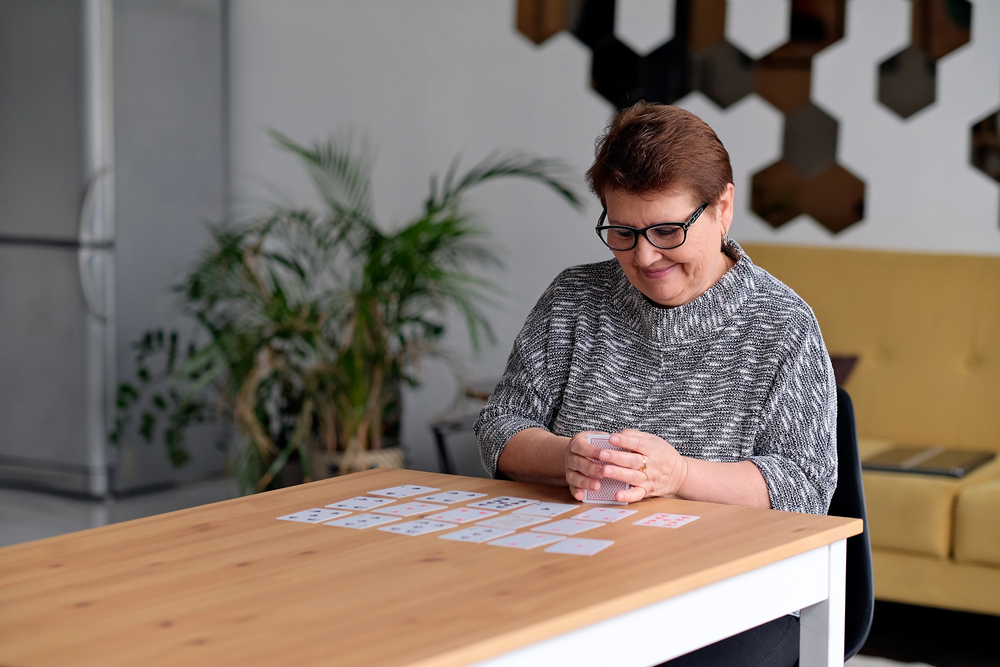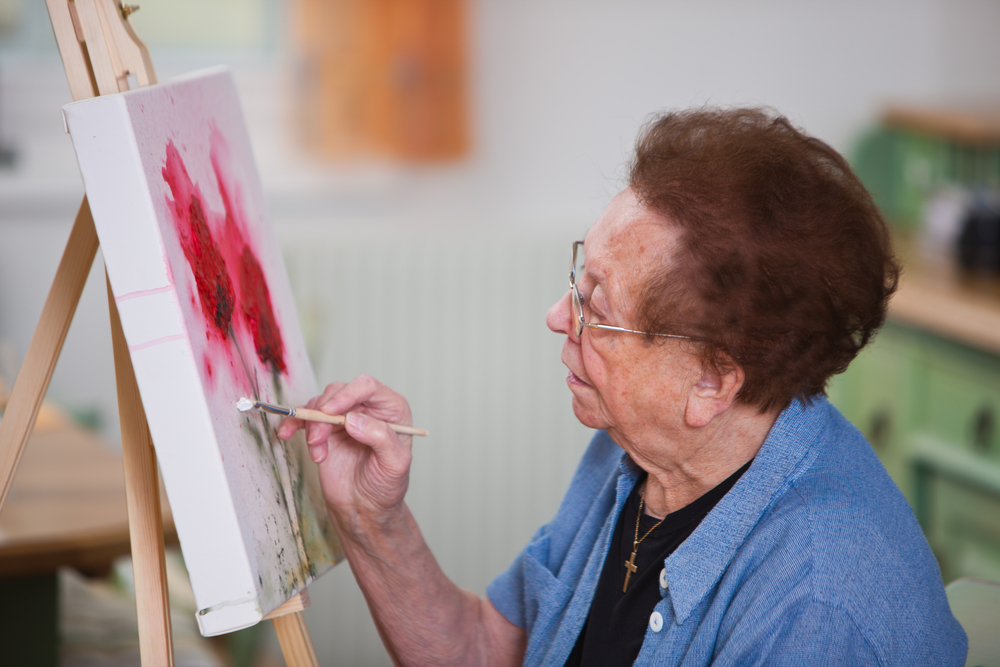
Understanding Physical Therapy Benefits For Seniors
January 13, 2025
Recover Better with Orthopedic Rehabilitation at Maplewood Sauk Prairie
March 8, 2025Experiencing some memory loss is normal as we age. However, there are ways to help your brain work better and keep your mind sharp. There are medications for more serious problems, but adding fun activities to your day can really help. If you want to improve your memory, think about trying a new hobby or doing some fun activities.
At Maplewood of Sauk Prairie Health and Rehabilitation Center, we believe in the power of fun and meaningful activities to support cognitive health.
This article looks at how art therapy, music and movement, and mindfulness and meditation can help boost your memory.
Three Key Activities to Enhance Memory
Adding some brain games and brain-boosting activities to your daily or weekly routine can help improve your memory and overall thinking skills. These activities are fun and provide a nice challenge for your mind.
Here are three important activities that can make your memory function better:
1. Engaging in Art Therapy
Art therapy is a type of therapy that helps improve mental and emotional health by making art. This includes different forms like painting, drawing, sculpting, and crafting. When people take part in art therapy, they can express their feelings, deal with emotions, and improve their thinking skills.
Joining art therapy can boost brain function in many ways. First, it sparks creativity and imagination, which helps the brain get stronger. Second, learning a new skill like painting or sculpting challenges the mind and supports brain health.
No matter if you are an experienced artist or just starting out, art therapy is a rewarding way to boost cognitive function and discover your creative side.
2. Incorporating Music and Movement
Music and movement are known to be helpful for us, especially for our memory and daily functioning. Listening to music, playing a musical instrument, or dancing can really improve working memory, coordination, and how our brain works overall.
Here’s how music and movement can help your brain:
- Music helps the part of the brain that processes sounds. This can improve how we remember things.
- Moving around uses different areas of the brain. This includes areas that help with skills like balance and awareness of space.
- When we combine music and movement, it connects our brain and body. This can make our memory even better.
3. Practicing Mindfulness and Meditation
In our busy world, stress and too much information can harm our memory and thinking skills. Mindfulness and meditation are great ways to help calm our minds, lower stress, and boost memory function, ultimately improving attention control. Regularly practicing these methods can lead to big gains in our cognitive abilities.
Mindfulness means staying focused on the present moment without judging it. On the other hand, meditation helps you feel very relaxed and clear in your mind. Doing mindfulness activities, like mindful breathing or body scan meditation, trains your brain to focus better and cut out distractions. This helps improve your concentration and memory.
Deep Dive into Art Therapy for Seniors

Art therapy is a fun and helpful activity for seniors. It can boost memory function and stimulate the brain. As we get older, we may worry about cognitive decline. However, art therapy gives a joyful way to challenge the mind and improve memory.
By expressing themselves creatively and exploring art, seniors can access their mental skills. They can experience how powerful art therapy can be.
Benefits of Art Therapy on Memory
Art therapy has many benefits for older adults, especially for brain health. Doing creative activities can really boost memory, help cognitive function, and improve well-being.
Art therapy gives a fun way to express oneself, which can lower stress and lift mood. It lets older adults use their cognitive abilities by painting, drawing, or sculpting. These activities can enhance fine motor skills, hand-eye coordination, and problem-solving skills.
Also, art therapy can act as a memory exercise. When they create pictures of memories or play art-related memory games, it helps to jog their memory and support cognitive function.
Practical Art Therapy Activities to Try
If you want a great way to boost your mind and get creative, try these fun art therapy activities:
- Painting: Use colors and brushstrokes to show your feelings and memories.
- Drawing: Draw what you see, make portraits, or let your creativity flow on paper.
- Sculpting: Shape clay or other materials into three-dimensional art, which helps your hand skills and spatial thinking.
- Collaging: Collect magazines, fabrics, and more to create unique pieces that show who you are and what you like.
- Crafting: Try different craft skills like knitting, crocheting, making jewelry, or woodworking.
The Role of Music and Movement in Memory Care
Music and movement are very important in memory care. They provide a fun way to help improve thinking skills and make life better for people with memory issues. Listening to familiar songs, playing instruments, or dancing are great activities. Music and movement can bring back feelings, trigger memories, and create happiness.
When we include music and movement in memory care programs and daily life, we use the brain’s natural ability to enjoy rhythm, melody, and motion. This helps create a positive, engaging space supporting memory function and overall cognitive health.
How Music Stimulates Cognitive Functions
Music greatly affects the brain and can help with different thinking skills. Some studies show it might be good for people with Alzheimer’s disease. When we listen to music, many parts of the brain work together. These parts help with memory, language, emotions, and movements.
Listening to music lets the brain focus on melody, rhythm, and harmony. This starts activity in the auditory cortex, hippocampus, and prefrontal cortex. These areas help us form and retrieve memories and make decisions. Music can bring up strong feelings and memories, helping us remember and enjoy past experiences even more. This emotional link can make it easier to recall memories and improve our mood.
Also, playing a musical instrument requires good motor skills and coordination. It challenges the brain and helps keep our thinking skills sharp.
Movement Activities That Promote Brain Health
Doing regular physical exercise is good for your body and helps your brain too. Exercising increases the blood flow to your brain, which can induce structural changes. This brings important nutrients and oxygen to brain cells. More blood flow helps improve memory, focus, and the speed at which you process information.
Here are some activities you can try to get moving:
- Brisk Walking: Take regular walks in nature or around your neighborhood. Enjoy the fresh air, and enjoy how it benefits your brain.
- Dancing: Join a dance class or play some music at home. Move to the rhythm and have fun.
- Tai Chi or Yoga: Take part in these gentle practices. They combine movement, mindfulness, and deep breathing.
- Swimming: Enjoy swimming as a low-impact exercise. It works many muscles and promotes good heart health.
Mindfulness and Meditation as Memory Aids
Mindfulness and meditation are not just good for lowering stress. They also help with overall brain health and well-being. These practices can improve your attention, focus, and flexibility in thinking. All these skills are important for memory function. By using mindfulness and meditation in your daily routine, you can develop a calmer mind that is more focused. This will help strengthen your memory and improve your thinking skills.
These practices are simple and can be done by people of any age.
Understanding the Connection Between Meditation and Memory
Meditation is an old practice that teaches the mind to focus and change thoughts. It is becoming more popular for its benefits in boosting memory. Meditation keeps the brain active. It helps make stronger connections between brain cells. This practice also improves our attention and focus, which are important for storing and remembering information. When we are often distracted, it’s hard to remember things well. Meditation helps calm our thoughts so we can focus better and remember more clearly.
In addition, meditation can increase gray matter in the brain, especially in places linked to memory, like the hippocampus. This growth can help improve memory capacity and boost overall cognitive performance.
Simple Mindfulness Exercises for Daily Practice
Incorporating mindfulness into your everyday life is not hard at all. Here are a few easy exercises you can try:
- Mindful Breathing: Sit comfortably, close your eyes, and focus on your breath. Notice how it feels when you inhale and exhale. Don’t try to change it.
- Body Scan Meditation: You can lie down or sit comfortably. Start with your toes and notice any feelings there. Then, slowly move your focus up your body, paying attention to each part. This helps you be aware of your body and can ease tension.
- Mindful Walking: Focus on how your feet feel on the ground, the movement of your body, and the sights and sounds around you. You can do this inside or outside.
- Mindful Eating: When you eat, use all your senses. Notice the taste, texture, smell, and look of your food. Chew slowly and enjoy each bite, and appreciate the nourishment it gives you.
Memory activities like art therapy, music, movement, and mindfulness can help your memory. These activities take a well-rounded approach to memory care, allowing your brain work better and promoting brain health. Taking part in these fun experiences improves your memory and supports your well-being and quality of life.
Maplewood Sauk Prairie Health and Rehabilitation Center is dedicated to providing a supportive and enriching environment where our residents can thrive. By integrating art therapy, music and movement, and mindfulness and meditation into our daily routines, we help our residents maintain and enhance their memory and cognitive health. These activities offer a holistic approach to memory care, promoting better brain function and a higher quality of life for all our community members.
References:
https://www.mayoclinic.org/healthy-lifestyle/healthy-aging/in-depth/memory-loss/art-20046518
https://www.unitypoint.org/news-and-articles/10-surprising-activities-to-improve-memory-with-alzheimers


